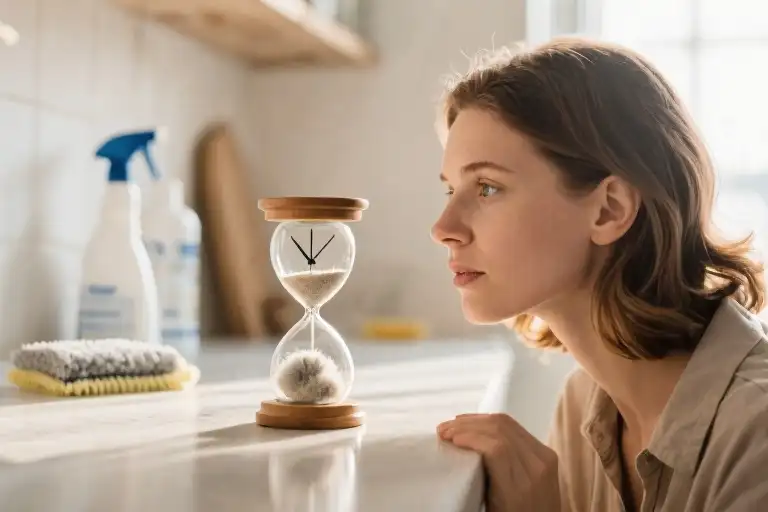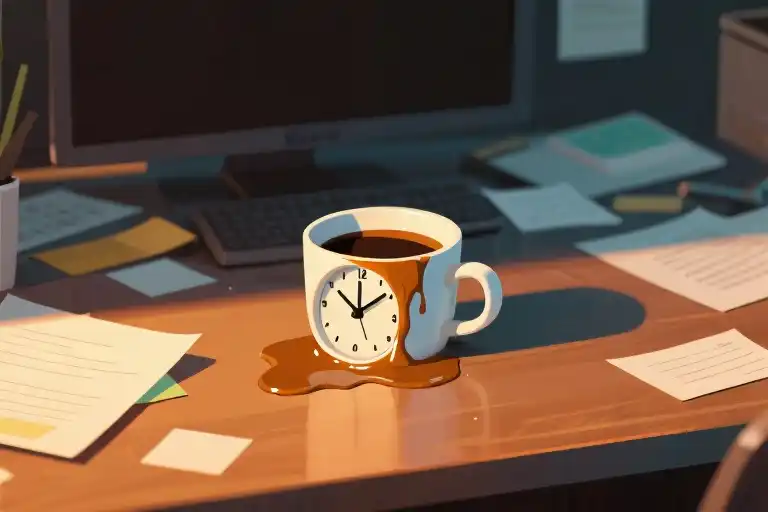“No one ever died wishing they’d worked more,” she said, rightness written all over her pretty face. The coffee between us had gone cold, but the tension was freshly brewed.
I shifted in my chair. “I don’t know.”
“No one ever died wishing they’d watched one more episode of Friends,” I countered. Her eyes rolled so hard I worried they might stick. “And certainly no one’s last thought was ‘I should’ve kept the house cleaner.'”
We sat with that uncomfortable truth while sunlight danced on the crumbs between us – the same crumbs I’d sweep up tomorrow, and the day after, in an endless loop of futility. The math suddenly seemed so clear: one hour daily cleaning × 365 days × 80 years ÷ 24 hours ≈ 1,219 days spent chasing dust bunnies that regenerate like mythical creatures.
Three and a half years of sunlight and breath. Gone. Swallowed by the vacuum cleaner’s roar.
“If this were your last week,” I asked quietly, “where would scrubbing the bathroom tile rank? Below hugging your kids? Beneath watching sunsets? Under reading that novel gathering dust on your nightstand?”
Her fingers tightened around her mug. Some truths are easier to swallow when they’re someone else’s problem.
We’ve all felt it – that creeping realization during laundry folding or email sorting that we’re exchanging irreplaceable life minutes for… what? The smug satisfaction of a tidy sock drawer? The performative cleanliness that pleases hypothetical guests who never visit?
Yet we persist. Like Sisyphus with a mop, pushing our boulders up the hill only to start again tomorrow. Because somewhere along the way, we confused being busy with being valuable, mistook clean for worthy.
Here’s what the calculator won’t show you: Those 1,000 days could have been:
- 3 languages fluently spoken
- 2 novels written
- 1,500 sunrises witnessed without rushing
- 12 countries deeply explored
- Countless bedtime stories uninterrupted by “just one more load”
The real question isn’t about cleanliness. It’s about consciousness. In a culture that worships productivity porn and Instagram-ready homes, choosing where to not spend your time becomes the ultimate act of rebellion.
So I’ll ask you what I asked her: If your days were currency, would you keep investing in dust?
The Deathbed Paradox
“No one ever died wishing they’d kept the house cleaner,” I say, watching her fingers tighten around the coffee mug. The steam rises between us like the unspoken arguments of a thousand Sunday mornings.
We all know the script:
- No one regrets not working more overtime
- No one misses that extra Netflix binge
- No one laments skipping one more PTA meeting
Yet here we are – vacuuming the same patch of carpet for the 8,763rd time.
The 1,000-Day Equation
Let’s do the terrifying math together:(1 hour/day × 365 days × 80 years) ÷ 24 hours ≈ 1,219 days
That’s 3.3 years of your one wild, precious life spent:
- Chasing dust bunnies that breed like tribbles
- Folding socks that’ll unravel by noon
- Scrubbing showers that get dirty again before the sponge dries
What else fits in 1,000 days?
- Becoming fluent in 3 languages
- Writing 2 novels
- Hiking the entire Appalachian Trail twice
- Holding every sunrise yoga pose while actually enjoying it
“But…” I hear you thinking, “cleanliness matters.” Of course it does. The real question isn’t about hygiene – it’s about the opportunity cost of our unquestioned routines. When we default to autopilot scrubbing, we’re not choosing what matters most; we’re reheating societal expectations from 1952.
The Ghost of Chores Past
My grandmother could tell you exactly which neighbor used which bleach brand in 1963. Her generation turned spotless floors into moral virtue – a worldview forged when:
- 72% of women weren’t in the workforce
- “Leisure” meant embroidering doilies between laundry loads
- Psychology hadn’t yet named “productivity guilt”
Fast-forward to today:
- Dual-income households still split chores 60/40 (guess who gets the 60)
- Instagram convinces us clutter-free homes equal enlightenment
- Robot vacuums circle while we stress-text about unmade beds
We’ve inherited Martha Stewart’s standards with Elon Musk’s schedules. No wonder 68% of working parents report feeling “time poor” (OECD, 2022).
But We Keep Doing It
Here’s the uncomfortable truth: We don’t clean because it needs doing – we clean because not cleaning feels worse. It taps into:
- The Zeigarnik Effect: Our brains obsess over unfinished tasks (like that crumb-filled toaster)
- Social Currency: A clean home signals “I have my life together” (even if we’re drowning)
- Control Theater: When the world burns, scrubbing tiles gives illusion of order
Yet every swish of that mop begs the question: *”If this were my last week alive, would this make the top 20?”
The Birth of Time Tyranny
The Gendered History of Household Labor
That loaded silence after calculating the 1,000 cleaning days statistic? It’s older than your grandmother’s vacuum cleaner. The expectation that domestic spaces must remain perpetually spotless didn’t emerge from thin air—it was carefully constructed through generations of gendered socialization.
Consider this timeline:
- Pre-Industrial Era: Household maintenance was visibly productive labor—churning butter, weaving cloth, tasks directly tied to survival. Mess equaled genuine consequences (spoiled food, vermin infestations).
- 1950s Domestic Revolution: Post-WWII marketing campaigns reframed cleaning as moral virtue for suburban housewives. Iconic ads showed smiling women polishing floors while voiceovers declared: “A clean home is a happy home!” (Note the complete absence of men in these narratives.)
- 1980s Superwoman Syndrome: As women entered workplaces en masse, the “have it all” myth emerged. Now expected to maintain both career and spotless homes, the average woman’s cleaning time only dropped from 30 to 27 weekly hours (OECD data)—a paltry 10% reduction despite 50% labor force participation.
This historical context explains why even today, women report 2.5x more guilt about household mess than men (Journal of Environmental Psychology). The broom handle might be lighter now, but the psychological weight remains crushing.
The Instagram Perfection Trap
Scroll through any #CleanTok or #HomeGoals feed, and you’ll encounter a new species of time predator: aestheticized domestic labor. These carefully staged vignettes—sunlight glinting off marble countertops, color-coordinated pantry shelves—aren’t documenting reality; they’re selling aspirational anxiety.
Key psychological mechanisms at play:
- The Highlight Reel Effect: We compare our behind-the-scenes chaos to others’ curated best moments, creating false benchmarks. (No one posts their 11pm frantic pre-guest panic-cleaning sessions.)
- The Visibility Bias: Social media disproportionately rewards visually impressive chores (folded towel pyramids) over invisible but crucial tasks like scheduling doctor appointments.
- The Dopamine Double-Bind: That fleeting satisfaction from posting a #CleanHouse selfie? It chemically reinforces the cleaning-performance link, making us crave validation through domestic labor.
A 2022 Cornell study found that for every hour spent viewing “home perfection” content, participants reported 17% higher stress levels about their own living spaces—yet kept consuming more. This isn’t accidental; it’s algorithmic exploitation of our deepest insecurities.
When Cleanliness Becomes Moral Judgment
Here’s where time tyranny crosses into dangerous territory: the quiet assumption that messy homes indicate flawed character. Notice how we:
- Call cluttered people “lazy” but never say organized people are “obsessive”
- Assume clean offices mean productive workers (despite studies showing moderate mess correlates with creativity)
- Equate childhood cleanliness with “good parenting”
This moral dimension explains why simply outsourcing cleaning often feels inadequate—we’ve internalized that we should be doing it ourselves to prove our worth. As philosopher Byung-Chul Han observes in The Burnout Society: “Today, we exploit ourselves voluntarily, believing we are fulfilling ourselves.”
Transition: When vacuuming becomes virtue signaling, we’re not just losing hours—we’re surrendering our right to define what makes a life well-lived.
Cognitive Tools to Reclaim Your Time
The Time Value Formula: A Lens to Re-evaluate Daily Choices
The math is startlingly simple yet profound:
(Activity Joy Index × Duration) ÷ Opportunity Cost = Time Value Score
How it works:
- Rate the happiness (1-10) an activity genuinely brings you
- Multiply by time spent (in hours per week)
- Divide by what you sacrifice – that language course postponed, family moments missed, or creative projects shelved
Real-world application:
- Scoring 3/10 for scrubbing bathrooms (2hrs/week) with opportunity cost of skipped yoga class: (3×2)÷7 = 0.85
- Scoring 8/10 for reading bedtime stories (5hrs/week) with minimal trade-offs: (8×5)÷1 = 40
This isn’t about judging activities as ‘good’ or ‘bad’ – it’s about recognizing that not all hours hold equal weight. The formula exposes our cultural blind spot: mistaking motion (being busy) for meaningful progress.
The “Good Enough” Cleaning Standard Self-Assessment
Psychologist Donald Winnicott’s “good enough” principle applies perfectly to household care. Take this quick diagnostic:
| Question | Perfectionist (0) | Functional (1) | Liberated (2) |
|---|---|---|---|
| How often do you reclean already tidy areas? | Daily | When visibly dirty | Only before guests |
| Your reaction to a dusty shelf? | Immediate action | Weekend to-do list | “Ecosystem preservation” |
| Laundry folding method? | KonMari precision | Categorized piles | Clean basket = victory |
Scoring guide:
- 0-3: Time to examine your standards – who are they really serving?
- 4-6: Healthy balance – consider outsourcing pain points
- 7+: Your future self thanks you for reclaimed hours
Reframing Outsourcing: Not Laziness, but Strategic Time Investment
The modern resistance to hiring help often stems from deep-rooted beliefs:
- “I should do it myself” → What if that hour pays more as freelance work than a cleaner’s fee?
- “It’s not perfect unless I do it” → Does the difference matter more than your novel’s next chapter?
- “Others will judge” → Those judging likely aren’t living your priorities
Consider this: spending $50 weekly on cleaning could “buy” back 52 days/year – time to train for that marathon, launch a side business, or simply breathe. The ROI transcends money.
“Your 1,000 Days: What Will They Hold?”
That staggering number – 1,000 days – becomes tangible when visualized:
[Time Allocation Comparison Chart]
| Activity | Equivalent Days |
|---|---|
| Mastering Spanish | 200 |
| Writing a Novel | 300 |
| Pacific Trail Hike | 180 |
| Weekly Date Nights | 320 |
This isn’t about shaming cleaning, but about conscious choice. Maybe spotless floors genuinely bring you joy (score them highly!). But if they’re draining hours from what makes your soul expand, perhaps “good enough” is better than perfect.
Final reflection: When your days dwindle to single digits, which version of you will smile more – the one with immaculate baseboards, or the one who used those hours to become fluent in Italian, nurture deeper relationships, or finally start that community garden?
Your 1,000 days are waiting. How will you spend them?
The Silent Reckoning: What Will You Do With Your 1000 Days?
Her face pinched, fingers tightening around the coffee mug. That familiar silence stretched between us – the kind that follows uncomfortable truths. I resisted the urge to fill it with more words, letting the weight of those thousand days hang in the air.
Download Your Time Audit Worksheet
(Calculates your projected lifetime hours spent on chores vs. dream activities)
The Questions We Avoid
That unfinished conversation follows you home, doesn’t it? The way we both knew neither would concede. Modern life runs on these unspoken agreements:
- That sparkling floors equal moral virtue
- That productivity guilt is inevitable
- That ‘someday’ will magically appear for what matters
Time poverty isn’t about having fewer hours – it’s about misallocated ones. That PDF isn’t just a worksheet; it’s a mirror showing what your current choices project over decades. Notice which columns make your breath catch.
The #NOEWD Movement
Join others rewriting their narratives:#NOEWD (No One Ever Died Wishing…)
Recent submissions that shifted perspectives:
- “Used my ‘laundry hours’ to learn pottery. Now I gift mugs that say ‘Dirty dishes mean you fed people you love.'” – Marissa, 32
- “Stopped vacuuming daily. My kids’ dinosaur roars in the ‘dust jungle’ are my new happiness metric.” – David, 41
Your Silence Speaks Volumes
That tension in her jaw? I recognized it. It’s the moment cognitive dissonance sets in – when the life we’re living crashes into the one we claim to want. This ending isn’t about answers; it’s about sitting with that discomfort until it becomes powerful enough to change something.
Tomorrow’s small rebellion could be:
- Leaving dishes for morning sunlight
- Hiring help with the money saved from skipping 5 lattes
- Texting a friend instead of scrubbing grout
Face still pinched, but now thoughtful. That’s where change begins.





